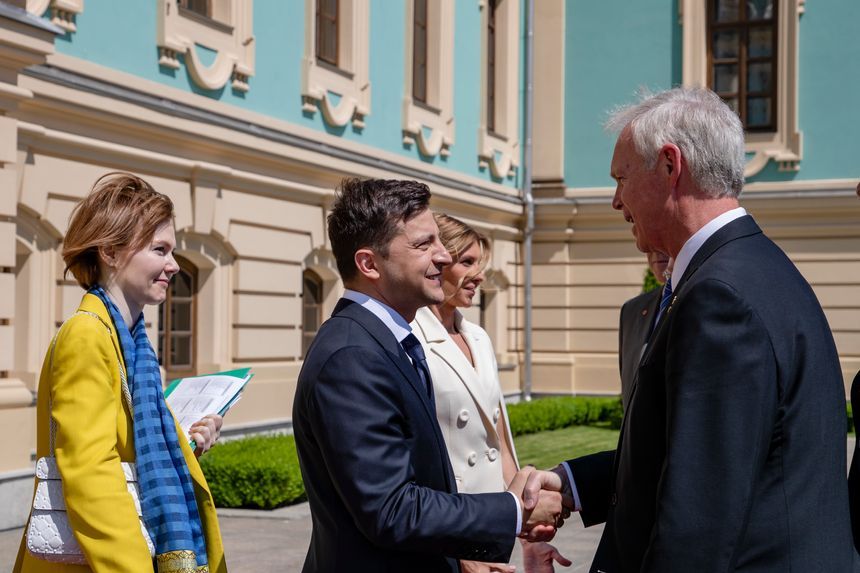
The Pelosi-Schiff impeachment shows what has gone so badly wrong with Washington.
By Daniel Henninger, WSJ, Nov. 20, 2019 6:56 pm ET

Ukrainian President Volodymyr Zelensky in Kyiv, May 20. Photo: U.S. Embassy Kyiv Ukraine
President Trump took a moment from his Cabinet meeting Tuesday to call the House impeachment hearings a “kangaroo court.” This is another Trump half-truth. Any fact-check will show that most of Washington has become a kangaroo court.
In any given week, one could identify someone the Washington kangaroos have put in the dock for condemnation. We will pick one example—GOP Sen. Ron Johnson of Wisconsin.
On Monday media reports identified Mr. Johnson as part of the Trump strategy of “smearing” witnesses appearing before Rep. Adam Schiff’s impeachment hearings. Let us note that the president lent plausibility to this charge by tweet-trashing Ambassador Marie Yovanovitch as she was delivering her testimony Friday, then on Sunday whacking Jennifer Williams, an aide to Vice President Mike Pence, as a “Never Trumper.” There seems to be one under every bed these days.
Once Mr. Trump does his part to elevate storylines like this, the press merely has to stop and frisk anyone who vaguely fits the profile. So it was Monday for Mr. Johnson.
Herewith the testimony of the arresting officers at the Washington Post: “The tactic was deployed in a prominent way Monday when Sen. Ron Johnson (R-Wis.) laid out criticisms against Lt. Col. Alexander Vindman. . . . Johnson wrote without evidence that Vindman may be a member of a rebellious ‘deep state’ that ‘never accepted President Trump as legitimate’ and is working in secret to end his presidency.”
Ron Johnson is one of the most independent-minded members of the Senate. He is frank in his opinions, to a fault. We should be grateful that the media singled him out in this way if only because it brought to our attention the full text of his 11-page letter to Reps. Jim Jordan and Devin Nunes, who asked for his account of what happened in Ukraine. Anyone desperate for useful context to this morass should read the senator’s letter.
For his sins, Mr. Johnson has become Congress’s principal advocate for Ukraine as it struggles to consolidate its independence—and overcome the existential threat—from Vladimir Putin’s Russia.
In the letter, Mr. Johnson expresses his disdain for how the Ukraine “whistleblower” narrative emerged: “If those working for the president don’t feel they can implement the president’s policy’s in good conscience, they should follow Gen. James Mattis’s example and resign. If they choose to do so, they can then take their disagreements public.”
Mr. Johnson pressed Mr. Trump in several meetings to see the larger stakes in the Ukraine aid. “I wasn’t suggesting we support the oligarchs and other corrupt Ukrainians,” he writes. He was urging support for “the courageous Ukrainians who had overthrown Putin’s puppet, Viktor Yanukovich, and delivered a remarkable 73% mandate in electing [Volodymyr] Zelensky to fight corruption.” Withholding such support, he told Mr. Trump, “looked horrible politically in that it could be used to bolster the ‘Trump is soft on Russia’ mantra.”
Because he wasn’t asked, at no point does Mr. Johnson raise the broader implications of the Ukraine episode for Mr. Trump’s foreign policy—but we will.
We will in no small part because the Pelosi-Schiff impeachment project reveals what has gone so badly wrong in Washington. The “resistance” has degraded into an endless personal vendetta between Mr. Trump, Democrats and the media. The rest of us are onlookers to what looks like a blood feud between families in 13th-century Italy.
The impeachment diverts attention from a more important issue that sits beneath the Ukraine narrative—to wit, Mr. Trump’s distant, increasingly isolationist attitude toward the world. No matter which global problem involves already existing U.S. interests, his common denominator is to back off and let it fester.
Ambassador Gordon Sondland’s Wednesday testimony makes clear that helping Ukraine defend itself was the point of all this internal effort. That was settled Trump administration policy until Mr. Trump took to obsessing over Ukraine’s alleged involvement in the 2016 U.S. presidential campaign. Then he began telling everyone: “They are all corrupt. They are all terrible people. I don’t want to spend any time with that.”
Hong Kong is in a grand rebellion against being subsumed inside a Communist Party model that has controlled China since 1949. But Mr. Trump has said little more about this historic struggle than, “I’m sure they’ll be able to work it out.”
As to the imperative of getting a trade deal with China, Ronald Reagan negotiated over nuclear missiles with Russia while simultaneously saying, “Mr. Gorbachev, tear down this wall.” Thirty years ago this month the Berlin Wall fell, freeing millions.
Mr. Trump’s foreign policy—as it has evolved, and despite the sort of heroic efforts we now know administration officials made on behalf of Ukraine—has become more Rand Paul than Ronald Reagan.
The Ukraine episode should be a pretext for an election-year debate about the U.S. role in the world. Instead, with all of Washington complicit, it’s a political kangaroo.
Write henninger@wsj.com.
Copyright ©2019 Dow Jones & Company, Inc. All Rights Reserved. 87990cbe856818d5eddac44c7b1cdeb8
